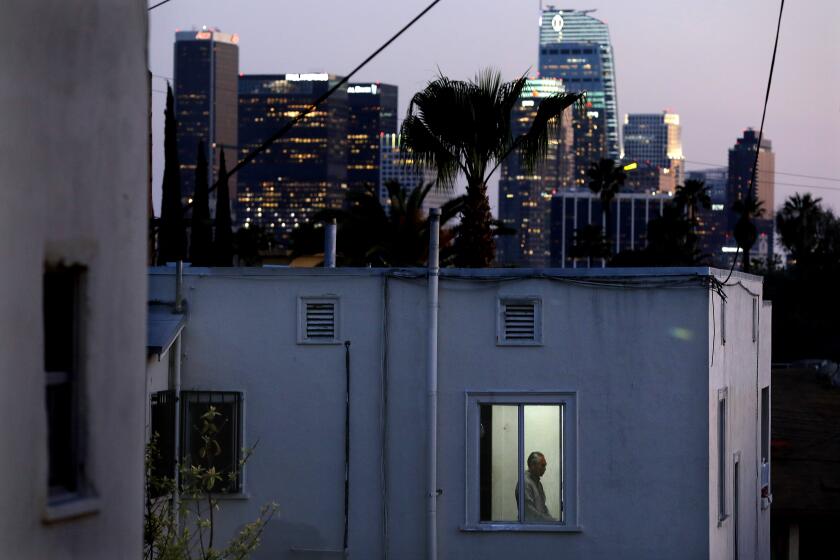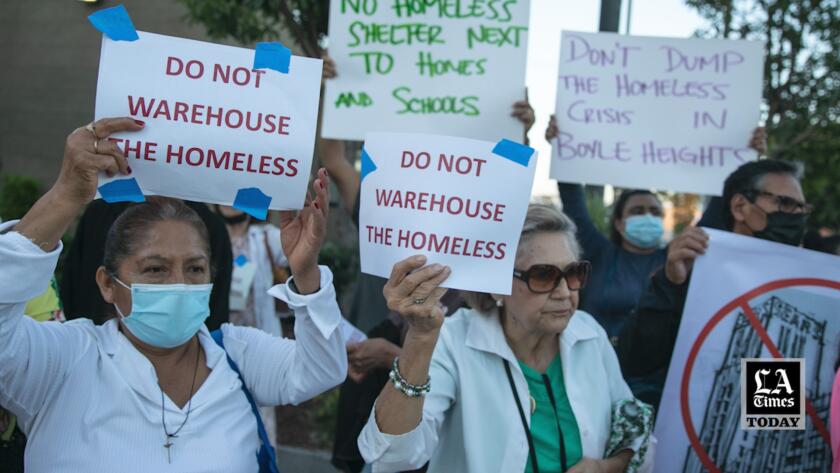NIMBYism over homeless housing spans race and politics, firing up suburban protests
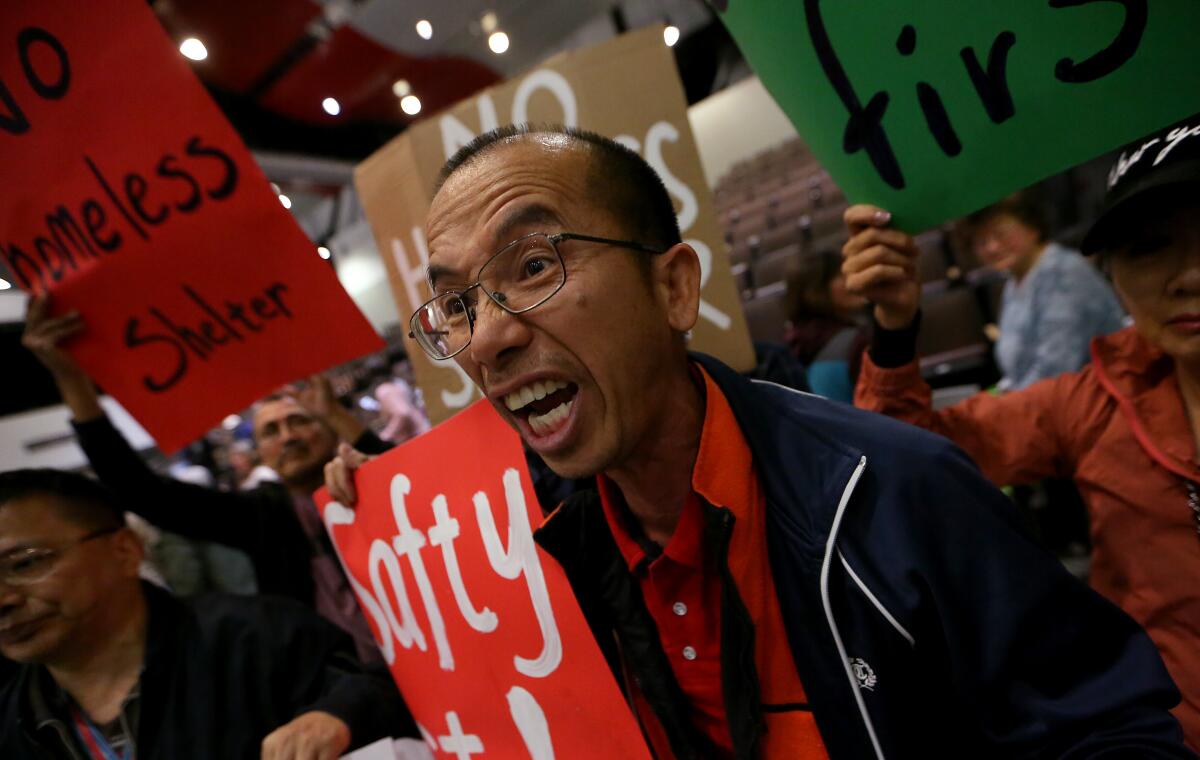
- Share via
Wilma Wu walked into the Hacienda Heights Community Center feeling upset that the powers that be were again trying to force her tranquil town to bear the burden of the county’s homelessness crisis.
Los Angeles County had converted a Motel 6 into a temporary shelter during the COVID-19 pandemic, and now officials wanted to turn it into long-term homeless housing.
“I had been hearing that they were going to bus people from other cities here,” Wu said. “People with drug and alcohol problems and mentally ill. This is what’s been circulating in the neighborhood.”
Wu, 51, had hopes she would learn more about the plan at a town hall meeting last week. Instead, she watched as hundreds of residents, mostly Chinese Americans, screamed and jeered at officials, including a Los Angeles County sheriff’s deputy who spoke about helping homeless veterans.
Amid a lack of affordable rentals, Southern California counties have tried addressing their homelessness woes by building tiny homes and temporary shelters, or converting motels and hotels into permanent housing. But their efforts have run into fierce “not in my backyard” opposition in suburbs from Chatsworth to Irvine, even as the areas have become more diverse and less conservative.
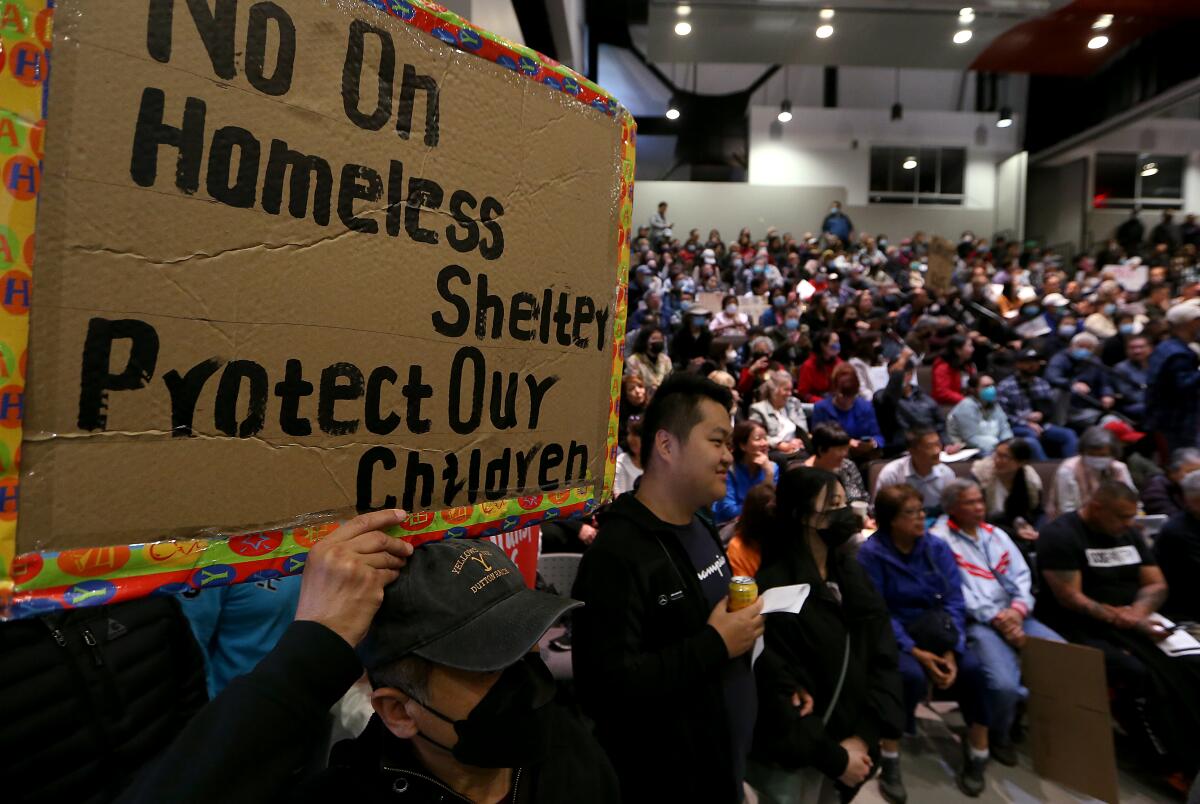
In terms of where to house homeless people, NIMBYism spans race and politics.
Five years ago, the Orange County Board of Supervisors had plans to build temporary homeless shelters in Laguna Niguel, Irvine and Huntington Beach. All three cities fought the plan, but the opposition was fiercest in Irvine — where hundreds of Chinese Americans and immigrants mobilized. Similar efforts happened in Arcadia, where Chinese residents opposed the construction of tiny homes.
As the L.A. rental market soars out of reach for many working families, one community wants to hold on to its low-cost housing.
“This is part of becoming a suburban American; sadly, this is what you assimilate into,” said Karthick Ramakrishnan, a professor of political science and public policy at UC Riverside. “You see other versions of this in other parts of L.A. and Southern California, where higher-income communities are able to deploy various tactics to prevent new developments that would change the character of the area or enable low-income residents to come in.”
It’s not just in Asian American neighborhoods; it’s happening in other diverse communities such as Lancaster and El Centro in Imperial County. Residents in urban areas such as Koreatown and Boyle Heights have followed suit, with opposition to proposed homeless housing in their neighborhoods, citing the unfairness of wealthier towns’ ability to keep such projects at bay.
Of course, none of these neighborhoods is monolithic. And younger people tend to be more supportive of creating housing for people experiencing homelessness.
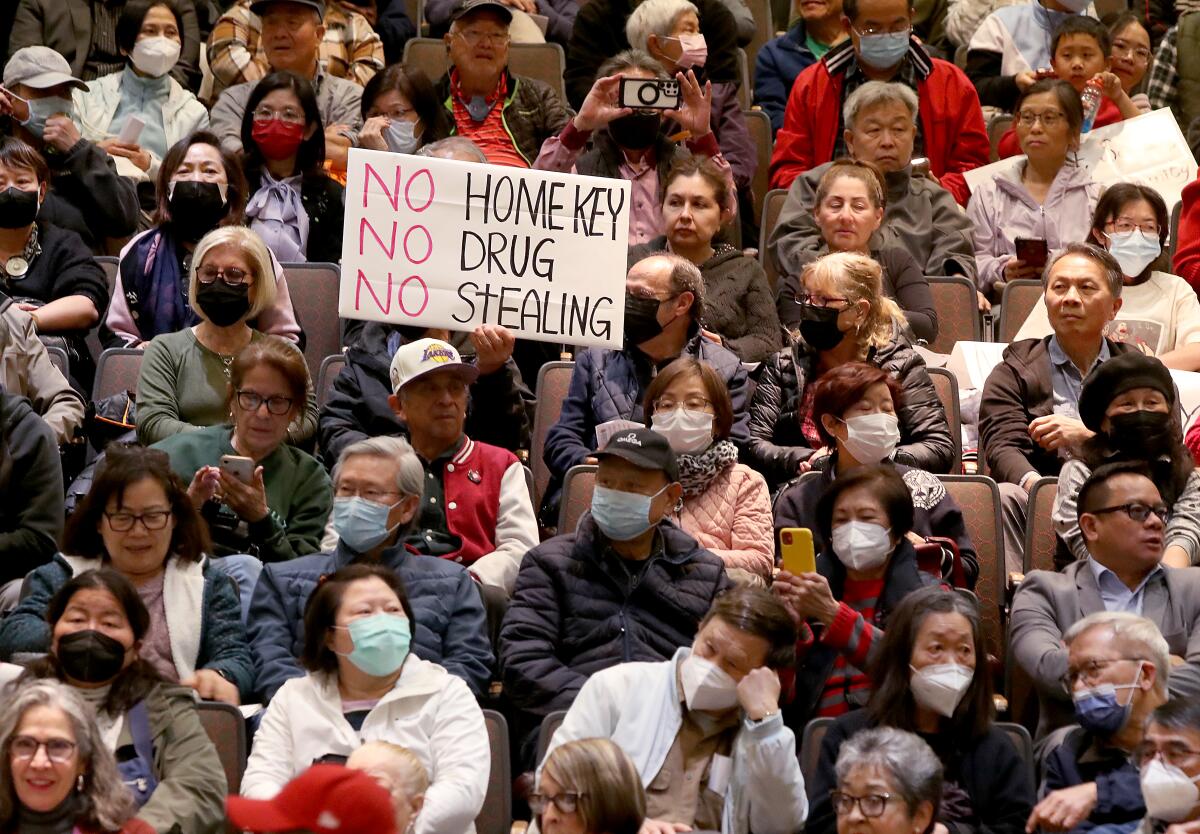
At the town hall in Hacienda Heights — an unincorporated bedroom community 16 miles east of downtown Los Angeles — shouting matches broke out between warring sides. Water bottles were thrown.
“I saw an elderly couple throwing scrunched-up paper,” Wu said.
The Hacienda Heights Chinese American Assn. led the protest, with county officials barely able to get a word in to address concerns about public safety or debunk common myths surrounding people experiencing homelessness.
David Fang, president of the association, did not respond to requests for comment.
Hacienda Heights was 60% white in 1980. Now that figure is 11%, while Latinos make up 45% and Asians 40%, but the stalwart suburban issues of quality schools and public safety remain the same.
Los Angeles County Supervisor Hilda Solis expressed disappointment about the community’s reaction toward a project she said was key to addressing homelessness.
“The San Gabriel Valley has a lot of people that are homeless,” she said in a phone interview. “This is what we have to do to rectify that problem, but how do we get there if people aren’t willing to understand that?”
The controversy over the project, dubbed the 7th Avenue Village, dates to November 2020. At the time, county officials had purchased the building through Project Homekey, a state program that allows local governments to buy hotels, motels and other buildings to convert into permanent or long-term housing.
The motel sits behind a Denny’s and a Chevron, and is flanked on three sides by an offramp of the 60 Freeway. An elementary and middle school are short walks away — which residents cited as one of the main reasons they oppose the project.
“I care about my kid; his safety is the most important thing,” said Zig Jiang, a longtime resident who lives a mile from the motel. He said his 15-year-old son attends a nearby high school. “I don’t want this so close to schools.”
Residents said they also oppose the project because they were never informed about the county’s effort to convert the motel into apartment units for homeless people.
“I didn’t even get a chance to give my opinion on this,” Jiang said. “It’s just wrong.”
Alitzah Wiener, a longtime resident, echoed that frustration.
“We weren’t even considered in this new development that they’re doing,” she said. “It was just like, ‘Here it is. You’re going to like it no matter what.’”
County officials said efforts were made to inform the public about the project, but to what extent is unclear.
Petitions to stop the 7th Avenue Village project were signed by thousands of people online.
Residents and workers at the restaurant and gas station said they had grown weary of their new neighbors at the motel during the pandemic. They listed a host of problems: public urination, discarded needles in nearby parks, increased encampments and crime such as thefts.
The Los Angeles County Sheriff’s Department’s 2020-2021 crime data show a minor increase in violent crimes and burglaries. The data, however, include months before the hotel began operating as a shelter. It also lumps in statistics from other unincorporated communities within the local sheriff station’s coverage area.
The data show burglaries increased by 57% from 220 to 346 over the last two years, but overall crime has dropped significantly, as did homelessness. The Los Angeles Homeless Services Authority saw the number of people experiencing homelessness in Hacienda Heights fall from 288 in 2018 to 174 in 2022.
Rick Cole, a municipal reformer who has been mayor of Pasadena and a city manager in Santa Monica, Azusa and Ventura, said communities are more likely to work with government on projects when they’re included in the process.
“I think that’s a harder road, a longer road, but it’s the only road that gets you to the right destination,” said Cole, who is now deputy chief controller of Los Angeles. “Eight out of 10 times, if you get ahead of the anger and resentment, you can deal with prejudice and fear.”
In Hacienda Heights, residents mostly came to the meeting demanding that the county stop its plans and relocate the project elsewhere. Dozens went home when the auditorium reached its 300-person capacity, while many others stood in the hallway listening to county officials.
Irene Wong, 62, said she didn’t support the project because she didn’t think there were enough resources for homeless people in the area.
“We don’t have many jobs for them here,” Wong said. “We just want a safe place to live.”
County officials said the project would include services such as case managers and job training.
Ramon Martinez, 70, who lives a block away from the hotel, said he opposed the project because he believed the county didn’t have enough resources to handle mentally ill people.
He said he’s been harassed while walking around the neighborhood.
“They ask for money, and when you deny them they get angry,” he said. “The project’s just not good for our community.”
Gabriel Monares, 55, who lives near the motel, felt differently about the project. He said he hadn’t experienced any problems with people at the motel.
“I think people are just scared and misinformed,” he said. “There’s a lot of fear about what’s going to be there.”
Monares said many residents have forgotten that the motel used to be a nuisance before the shelter arrived. A sheriff’s deputy was killed at the motel in 2004 during a shooting, according to the Sheriff’s Department.
County officials said the plan is to convert 142 of the 174 motel rooms into studio apartments. Two units will be used for managers, while the rest will be used for office and meeting spaces for case managers and other service providers. Officials plan to clear the motel for construction by the end of the month. They expect to complete the project next fall.
As the crowds left the auditorium that Thursday night, Wu made her way to Mary-Jane Wagle, co-director of Women Organizing Resources, Knowledge and Services. The affordable housing development group will own the property and oversee the renovation.
Wu told Wagle people were rowdy because they needed more information about the project. “Today was kind of crazy, but it’s because you know —”
“Yeah, people didn’t feel included,” Wagle said.
“Yeah,” Wu responded. “I came here thinking this was going to be a shelter, but permanent housing is different because you’re helping people who want to be helped.”
Wu said she had been leery of the project because of inaccurate information neighbors had circulated. Now she understood. Still, she had reservations.
“I don’t like that it’s going to be near the schools.”
- Share via
Watch L.A. Times Today at 7 p.m. on Spectrum News 1 on Channel 1 or live stream on the Spectrum News App. Palos Verdes Peninsula and Orange County viewers can watch on Cox Systems on channel 99.
More to Read
Sign up for Essential California
The most important California stories and recommendations in your inbox every morning.
You may occasionally receive promotional content from the Los Angeles Times.
